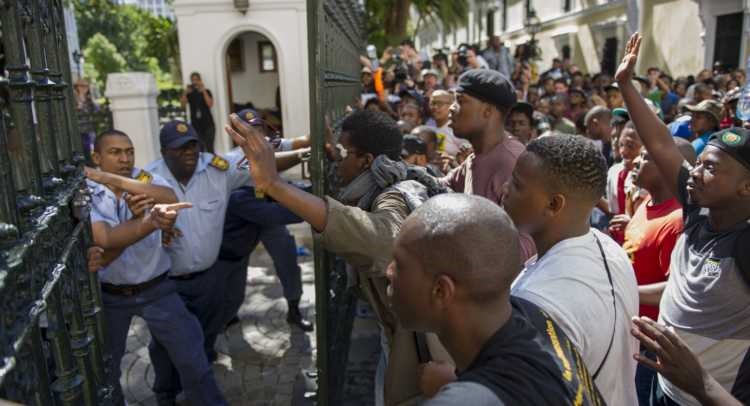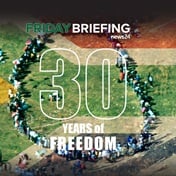
Young people represent a potentially powerful political force in South Africa. If they all voted, they could fundamentally change the political landscape. People under the age of 29 years old make up 21,4% of the electorate or around nine million people. If they wanted to, they could ensure that political parties and politicians would pay close attention to addressing their concerns.
Unfortunately, young people remain at the margins of politics and despite rhetoric to the contrary, are largely ignored by most political parties.
The main reason for this is that to get power, politicians tend to pay particular attention to the concerns of those who may vote for them, and most young people do not vote. Only 50% of people under the age of 29 are registered to vote in this year's general election. This is down from 64% of this age group who registered to vote in the 2014 election.
READ: Ramaphosa cuts a lone figure as he drags ANC to the polls
Of those aged 18 and 19 years old, only 16% registered for this election which is less than half the proportion registered to vote in 2014. A smaller proportion will actually turn out to vote as many people register but still do not turn up at the ballot box.
This situation is not unique to South Africa. Globally, there have been declining proportions of young people partaking in democratic elections. Some analysts mistake this as a sign of young people being apathetic and uninterested in politics. But available evidence suggests otherwise. Internationally, it is an indicator of declining levels of trust in political leaders who are seen to be out of touch with the concerns of the youth.
The Institute for Security Studies (ISS) has for a number of years conducted qualitative research to better understand the factors influencing the type of political engagement influencing young people aged 18-29. In 2016 we published our findings of interviews with over 2 000 young people in all nine provinces in both urban and rural communities. In 2018, additional research with over 200 young people was undertaken to explore whether there were any differences between young men and young women in relation to their involvement in disruptive or violent public protests.
A key finding to emerge from both sets of the research was that young people are far from apathetic. They were aware of the political dynamics in the country, held clear views on the challenges that they experienced and were more than willing to engage and act. However, they felt alienated from formal politics, have little trust in politicians and had negative experiences of government agencies from which they required services. A majority of the young people interviewed are increasingly frustrated that their grievances go unheard and are highly critical of political leaders and parties who fail to engage with them in a meaningful manner.
Young people argue that they have witnessed elections before and that their parents or older family members have always voted. However, despite this, they have not seen meaningful improvements in their communities in their lifetimes. They raised various concerns that if they believed would be meaningfully addressed by a political party, would be encouraged to vote for that party. Clustered around four main concerns, they included high unemployment, inadequate access to quality and affordable education, high levels of corruption and poor infrastructure.
The lack of employment was a common and pressing concern. Young people want to be able to become independent, assume more adult responsibilities and eventually start families of their own. However, the lack of employment means that vast numbers of them remain stuck in a precarious situation, dependent on their families, on state grants or on piecemeal jobs. Most expressed frustration at this hopeless situation.
Another challenge mentioned frequently was that of inadequate access to free, affordable and quality education. Completing a matric did not mean that they had the skills necessary to obtain employment or become successful entrepreneurs. Access to tertiary education was limited due to poor-quality public-sector education. Even those who could obtain a sufficient matric grade were faced with inadequate funding opportunities and limited access to universities or colleges.
Young people were very aware of the negative impact of 'state capture' and widespread local government corruption on service delivery in their communities. They perceived ward councillors and public officials as primarily self-interested, using their authority for firstly for their family and friends, even if they did not reside in the community.
Young people noticed a lack of improvements while politicians and officials appeared to be living in luxury. As a result, infrastructure related issues such as inadequate access to affordable electricity, water, housing and reliable public transport, went unaddressed.
Frequently, young people referred to involvement in public protests as a preferable way to express their grievances and to obtain a response from those in authority. Formal democratic processes such as voting, signing petitions and attending meetings were generally not seen as effective. When asked why protests sometimes turn violent, the answer typically was because communities had little choice as this was the only way to force responses from local politicians and officials.
Although engaged and motivated to take action so as to improve their situation, many young people do not recognise voting as a viable option. Although protest action and other informal modes of political engagement are important, young people could promote substantial change in holding politicians accountable if they used their vote effectively.
The question remains, what, if anything, will it take for young people to grasp the future into their hands and do the one thing that all political parties care about? That is, making a cross on the ballot paper.
- Gareth Newham and Miché Roberts are with the Justice and Violence Prevention Programme at the Institute for Security Studies.




 Publications
Publications
 Partners
Partners
























